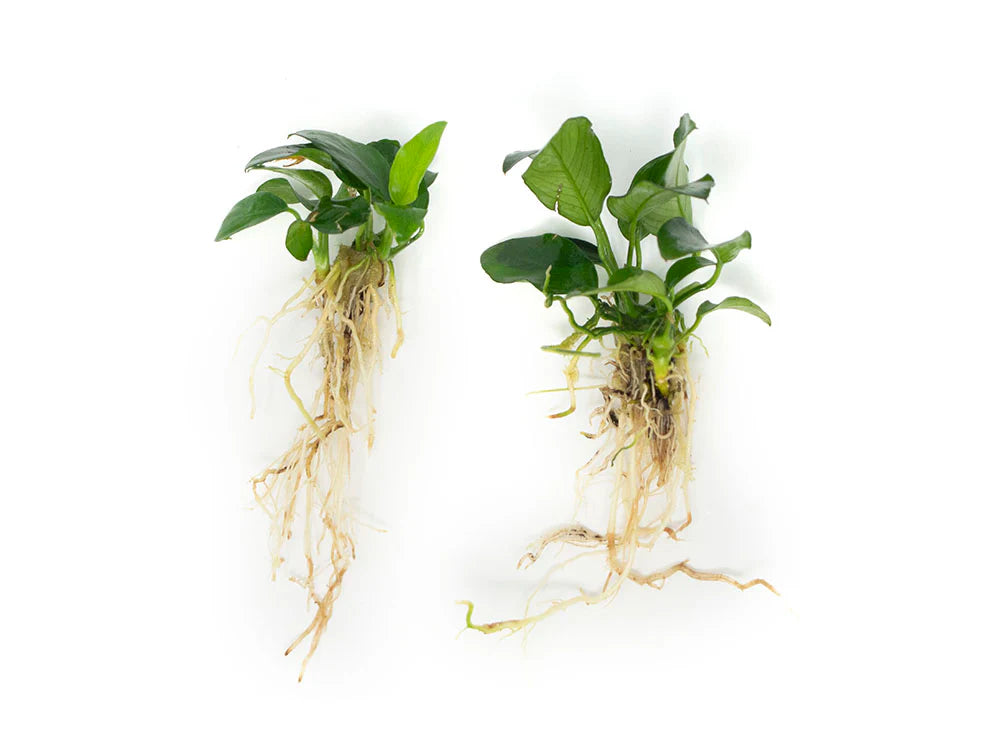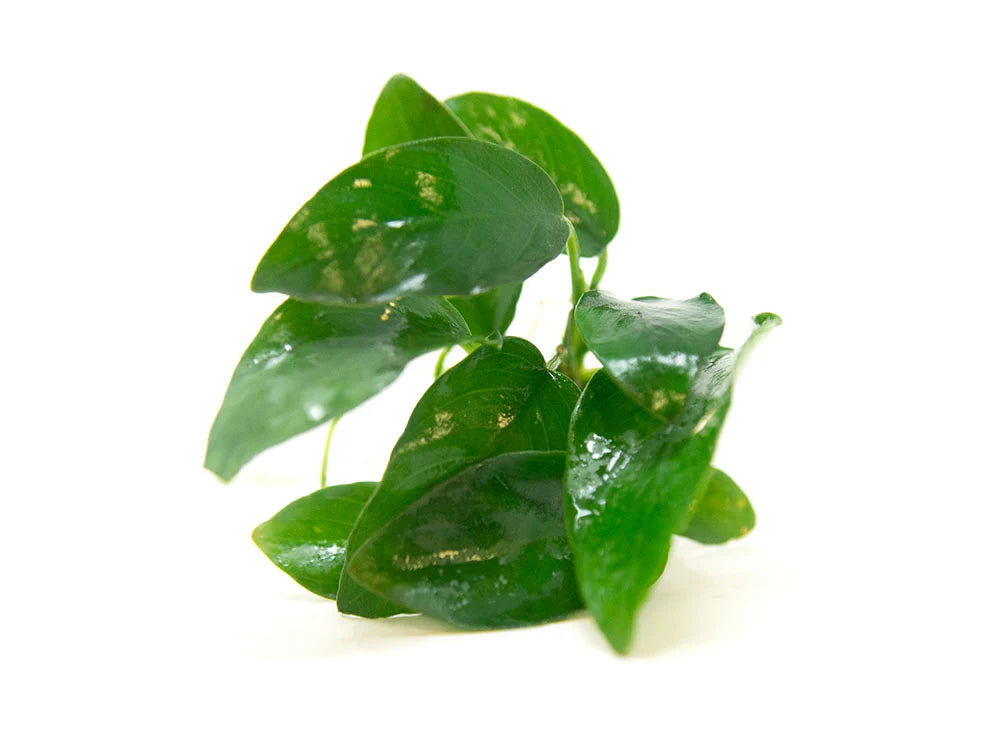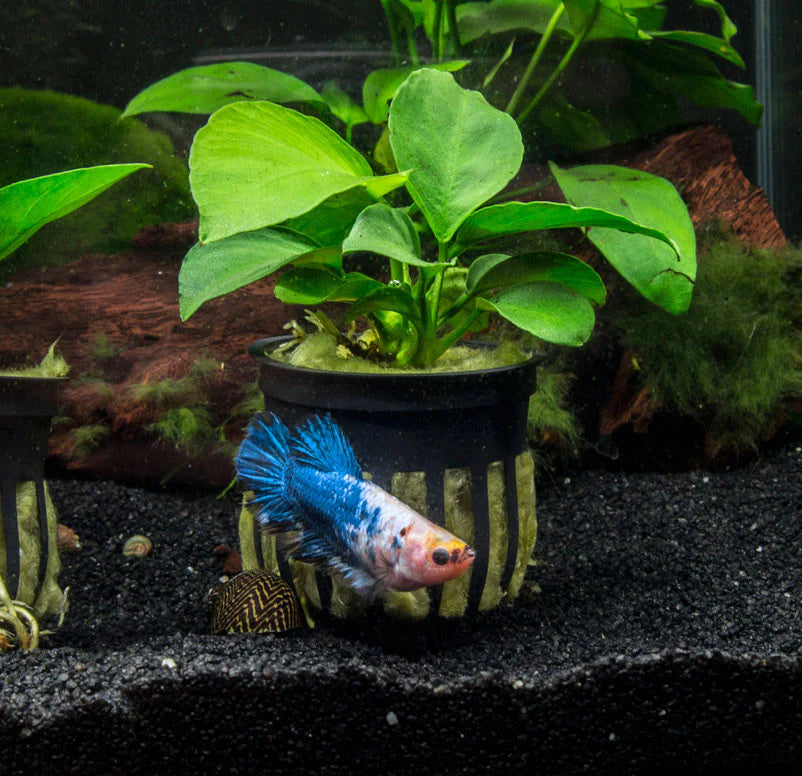Top Fin Aquatics
Dwarf Anubias (Anubias nana)
Dwarf Anubias (Anubias nana)
Couldn't load pickup availability
Â
Overview of Dwarf Anubias (Anubias barteri var. nana)
Common Names: Dwarf Anubias, Anubias nana
Scientific Name: Anubias barteri var. nana
Native Location: West Africa
Climate: Tropical
Size: Up to 6 inches tall
Care Level: Easy
Lighting: Low to high intensity
Water Parameters:
- Temperature: 72° - 82° F (22° - 28° C)
- pH: 6.0 - 7.5
- Water Hardness: Adaptable to various hardness levels
Placement: Foreground to midground
Substrate: Should be anchored to rocks or driftwood; rhizome should not be buried
Introduction
Dwarf Anubias, or Anubias nana, is a variation of the Anubias barteri plant, well-known for its hardiness and low maintenance requirements. This plant features large, dark green leaves with a smooth and leathery texture, adding a tropical touch to any aquarium. It can thrive both partially and fully submerged, making it versatile for various aquascaping styles.
Physical Characteristics
Dwarf Anubias has robust, leathery leaves that are pointed at the ends and dark green in color. These leaves can grow up to 6 inches tall and are known for their durability, often resisting nibbling from fish and other plant-eating critters. The plant grows from a rhizome, which should be kept above the substrate to prevent rot.
Growth and Care
Dwarf Anubias is notorious for its slow growth rate compared to other aquatic plants. However, it can grow more quickly and densely under high-intensity lighting. Despite its slow growth, it is an ideal choice for aquarists looking for a low-maintenance plant.
Lighting: Dwarf Anubias can adapt to a wide range of lighting conditions, from low to high intensity. Under higher lighting, the plant's leaves will grow more densely.
Water Conditions: This plant is very tolerant of various water hardness and pH levels but thrives best in soft water with a pH between 6.0 and 7.5. It prefers temperatures ranging from 72° to 82° F.
Planting and Maintenance
- Substrate: Dwarf Anubias should be anchored to rocks or driftwood rather than planted directly in the substrate. Burying the rhizome can cause it to rot.
- Trimming: Regular trimming of older leaves can encourage new growth.
- Fertilization: While not necessary, occasional fertilization can help promote healthier growth.
Benefits in Aquariums
Dwarf Anubias provides several benefits to the aquarium environment:
- Biofilm: Offers biofilm that is beneficial for shrimp and other invertebrates.
- Hiding Places: The dense foliage provides hiding spots for fish and invertebrates, enhancing their sense of security.
- Aesthetic Appeal: Its large, dark green leaves add a lush, tropical appearance to any aquarium setup.
Conclusion
Dwarf Anubias is an excellent choice for both beginners and experienced aquarists due to its hardiness, low maintenance, and aesthetic appeal. Its ability to thrive in a range of lighting conditions and water parameters makes it a versatile addition to any freshwater aquarium. With its durable, dark green leaves and slow but steady growth, Dwarf Anubias can be a centerpiece in a planted tank or a subtle addition to a diverse aquascape
No aquarium plant distributor/nursery/wholesaler/retailer can or will guarantee their plants to be 100% snail free. We can not guarantee our plants will be snail free
Aquarium Plant Policy Summary
At Top Fin Aquatics, we are committed to providing you with the freshest and healthiest aquarium plants. To ensure you receive the best quality, we now order plants weekly based on your online orders. Orders placed will be processed at the end of each week, with delivery expected on the following Thursday.
Please note that this policy does not include Tissue Culture plants. In addition, we will continue to offer a variety of plants for sale in-store. If you’re looking for a specific plant not listed on our website, feel free to contact us, and we will do our best to source it for you.
Thank you for choosing Top Fin Aquatics!
.
Share






